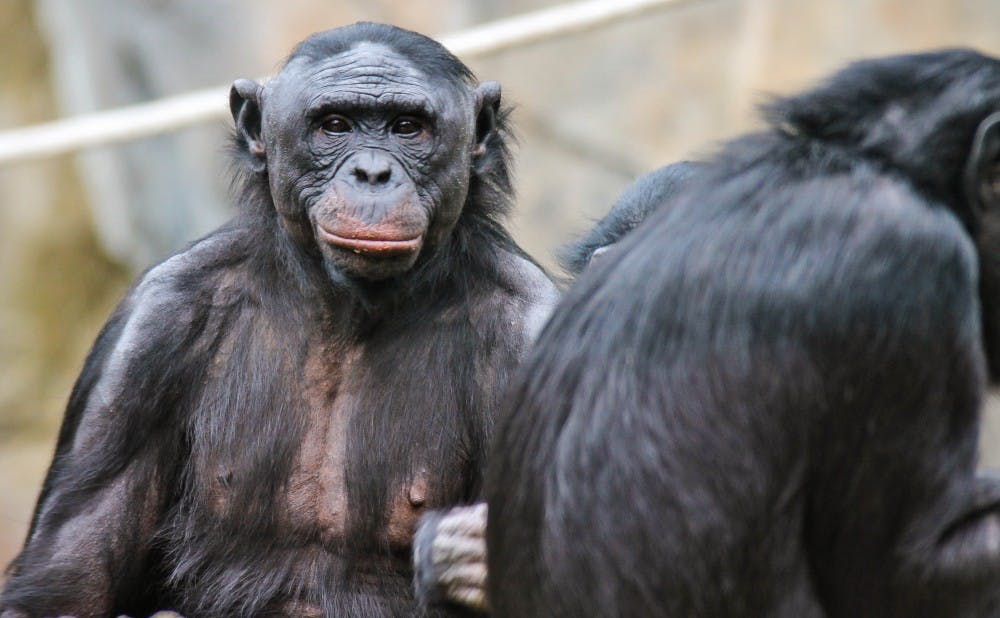For most people, helping others is a common occurrence, whether that means holding the door open for someone or loaning an umbrella to a friend in need. Friendly apes called bonobos might also be kind to strangers, a new study shows.
The research—led by Jingzhi Tan, a postdoctoral associate in evolutionary anthropology—showed that bonobos will help strangers get food even when they don’t receive any immediate benefit from their generosity. Published Nov. 7 in the journal Scientific Reports, the study built on previous work by Tan and Brian Hare, associate professor of evolutionary anthropology, indicating that bonobos share food with strangers.
Tan noted that the basis of the study was the idea that humans are the only animals who engage in altruism.
“We have an assumption that helping a stranger must be altruistic and that only in humans do we see this behavior,” Tan said. “If you look at one of our closest relatives chimpanzees, they hate strangers.”
However, studies on bonobos’ intergroup interactions in the past have revealed that they are not nearly as aggressive as chimpanzees and that they sometimes help each other, Tan explained. The researchers wanted to test the expense and limits of this.
Hare noted that bonobos are useful animals to research because of their close relation to humans.
“By studying bonobos, we can learn how traits that we think are special in ourselves might have evolved,” he said.
Along with Hare and Dan Ariely, James B. Duke professor of psychology and behavioral economics, Tan focused on wild-born bonobos at the Lola ya Bonobo sanctuary in the Democratic Republic of Congo.
To test the bonobos’ helpfulness, the researchers hung a piece of an apple from a rope above an empty room and led 16 bonobos one at a time into an adjacent room where they could see the apple hanging above them.
Although the animals couldn’t reach the fruit for themselves, if they climbed a fence separating the rooms, they could reach a wooden pin holding the rope to the ceiling and cause the fruit to fall into the adjacent room for another bonobo.
“In humans, sometimes you see we help each other without being asked,” Tan said. “Can bonobos do that? Will they help someone they don't know?”
Indeed, when the room had another bonobo in it, the animals were about four times more likely to release the fruit than when the room was empty.
In another version of the experiment, the bonobo in the other room was able to reach their arm those mesh separating the rooms and gesture for the treat. Even so, the bonobos on the other side were just as likely to help them out even when the stranger didn’t beg for the apple.
A second part of the study examined how often bonobos engaged in contagious yawning, a phenomenon among mammals in which seeing someone else yawn causes you to yawn as well.
“How contagious a yawn is is tied to how high the quality of the bond you have with the other individual,” Tan said. “In humans, you yawn more often if your relative is yawning compared to maybe someone random.”
The researchers had the bonobos watch a series of videos in which they saw a familiar group member either yawn or make a neutral expression. They also viewed clips in which a stranger from the Columbus Zoo in Columbus, Ohio did the same.
Many bonobos who saw the yawn also yawned, and stranger yawns were just as contagious as those of the familiar group members, Tan said.
The bonobos seemed to naturally respond to strangers in a positive way, Hare noted.
Tan said that these results are significant because they show that being nice to strangers is not unique to humans and doesn’t require language or cultural and social norms.
“The implication is that you don't need all these human institutions to make this happen,” Tan said.
This is especially relevant in considering problems of intergroup tension that have arisen when large numbers of immigrants enter a nation. The study’s results could inform intervention strategies to help resolve these issues.
“Knowing that some part of being nice to strangers is a predisposition, something that’s innate in our DNA gives an additional tool to approach this problem,” Tan said.
Hare also noted that the findings countered the perception the the most competitive species always wins in nature.
“I think this study shows that bonobos don't really fit that and that friendliness often wins in evolution,” he said. “Being friendly is often the winning strategy.”
Get The Chronicle straight to your inbox
Signup for our weekly newsletter. Cancel at any time.

